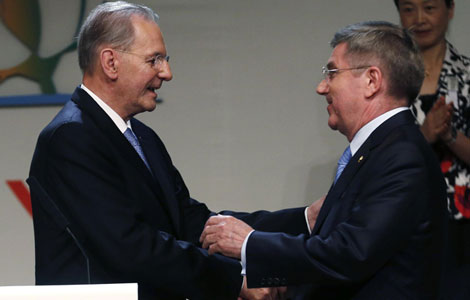US Senate halts vote on use of force in Syria
Updated: 2013-09-11 01:34
By Michael Mathes (Agence France-Presse)
|
||||||||
US Senate Majority Leader Harry Reid said on Monday he is delaying a key vote on authorizing the use of force in Syria to let President Barack Obama publicly address the issue.
Earlier in the day, the top Obama ally in US Congress had scheduled the crucial test vote for Wednesday but then backtracked to letvot the US leader sell his plan on strikes against the government of Syrian President Bashar al-Assad.
"I want to make sure the president (makes) his case to the Senate and the US people before voting on this matter," Reid said.
"I don't think we need to see how fast we can do this. We have to see how well we can do this."
Amid deep divisions in the US Congress over the way forward, and with growing skepticism among US citizens about the airstrikes, Obama is scheduled to meet with Democratic and Republican senators on Tuesday and to give a televised address to the nation that night.
Three polls out on Monday, by CNN/ORC International, the Pew Research Center, and the Washington Post/ABC, indicated a strong majority of US citizens don't want a congressional resolution to pass, and 63 percent or more oppose airstrikes.
Russia, which has blocked US and British efforts to gain a United Nations resolution approving international action against Syria, appeared to open a path toward a solution on Monday when it suggested a plan for Damascus to hand over its chemical weapons.
Obama called the plan "potentially positive", and hinted at congressional delays as his administration weighs Moscow's comments.
"I don't anticipate that you would see a succession of votes this week or anytime in the immediate future," Obama told US news network ABC.
His fellow Democrat, Senator Chris Coons, credited Obama's strike threat for helping prompt the Russian proposal, calling it "a welcome change" in Russian policy.
The US Senate Foreign Relations Committee member said he would work with fellow lawmakers on a plan that "allows both diplomacy and continued pressure".
But Republican Senator John McCain, who has long pressed for military action, said he remained "very, very skeptical" of Russia's offer.
"It's got to be verifiable, it's got to be definitive, and it's got to be time sensitive," he told reporters.
McCain said the plan would need to see inspectors enter Syria "immediately" to get the chemical weapons under control and removed within two weeks. He added that he would want to see the deal approved by the UN Security Council within a week.
Passage of Reid's Senate procedural step, known as a cloture vote, would let the chamber proceed to official debate on a resolution endorsing limited military action.
Should there be objections to the motion, as at least one Republican senator threatened last week, the 100-member chamber would need 60 votes to move forward.
Obama's Democrats control the Senate, but it is unclear whether the president has the necessary support to meet the 60-vote threshold.
Reid, however, said he has spoken to top Republican Senator Mitch McConnell and "virtually all my Democratic senators, and we have enough votes to get to cloture".
At least three lawmakers who had been among the many in the undecided column announced on Monday they would oppose the move to authorize a strike.
"After step A, what will be steps B, C, D and E?" veteran Republican Senator Lamar Alexander told his constituents.
"I see too much risk that the strike will do more harm than good by setting off a chain of consequences that could involve US fighting men and women in another long-term Middle East conflict."

 Premier stresses transformation of the economy
Premier stresses transformation of the economy
 Soyuz capsule returns from space station
Soyuz capsule returns from space station
 China's Christian churches reduce leaders' age ceiling
China's Christian churches reduce leaders' age ceiling
 Student's rare blood bonds Kazakhstan and China
Student's rare blood bonds Kazakhstan and China
 Apple's low-end phone price disappointing
Apple's low-end phone price disappointing
 US marks 9/11 anniversary
US marks 9/11 anniversary
 German Bach elected as IOC president
German Bach elected as IOC president
 Implant surgery for boy's eyes a success
Implant surgery for boy's eyes a success
Most Viewed
Editor's Picks

|

|

|

|

|

|
Today's Top News
Report questions US firms pursuing cloud computing in China
Reducing poverty gains momentum in Asia
China turns to US sorghum for animal feed
Kerry to meet with Russian counterpart on Syria
Li stresses transformation of economy
FM dismisses Philippine accusations
China's global firms face 'trust gap'
Trending news across China
US Weekly

|

|






